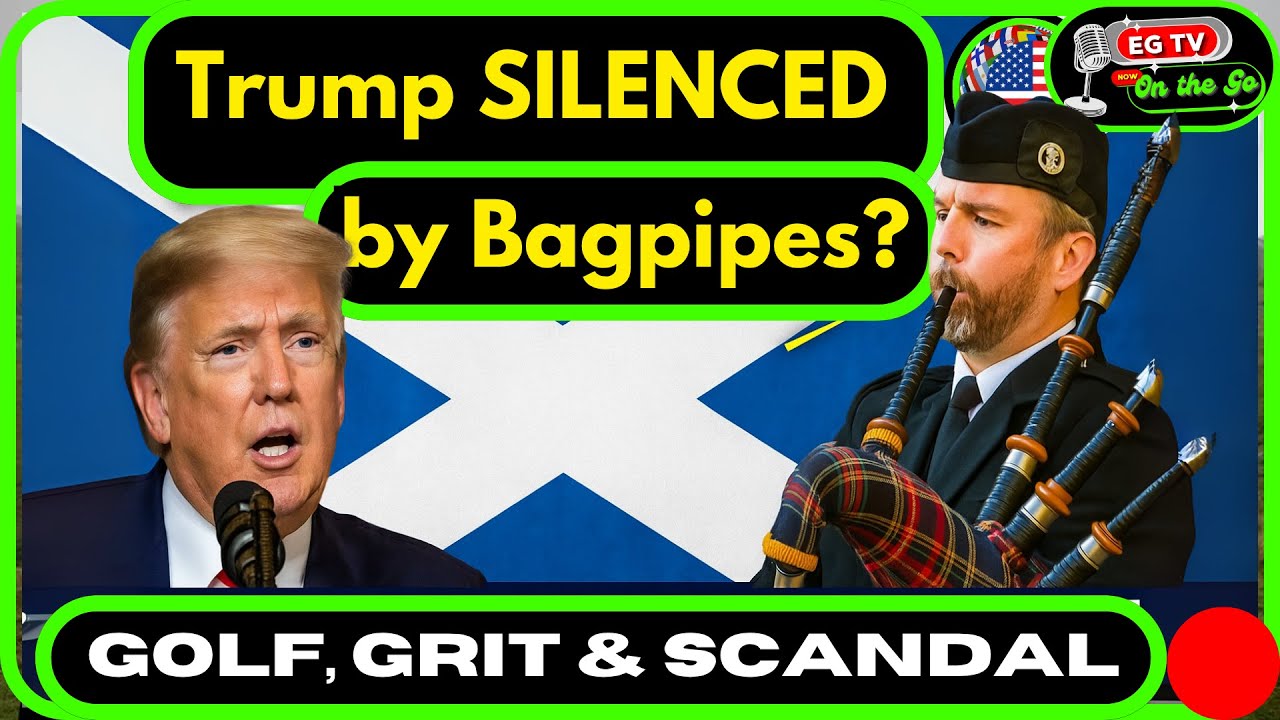In this episode of the EG TV PODCAST, we break down Donald Trump’s headline-making trip to Scotland — a visit packed with political tension, awkward diplomacy, and lingering scandal.
Trump’s meeting with UK Prime Minister Keir Starmer at his Turnberry golf resort quickly turned bizarre: Scottish bagpipes drowned out his press remarks, sparking a viral moment across social media. But the noise didn’t stop there.
We explore:
✅ The awkward Starmer meeting and Trump’s swipe at Sadiq Khan
✅ Trump’s resurfaced connection to Jeffrey Epstein and the newly released flight logs
✅ The controversy surrounding Trump’s comments on pardoning Ghislaine Maxwell
✅ Public backlash in Scotland and Trump’s troubled history with locals
✅ Ongoing political and legal crises facing Trump — from Gaza to Ukraine and beyond
Plus, stick around for our Deep Dive, where we analyze the critical FAQs and questions behind the headlines — from Epstein allegations to international diplomacy failures.
📌 Timestamps & Chapters Below
📺 WATCH VIDEO NOW: 📍 TRUMP DROWNED OUT by Bagpipes in Scotland: Golf, Politics, and the Epstein Fallout | 🎙️ EG TV PODCAST
🔗 https://www.youtube.com/watch?v=Hu-8HTowdHE
⏱️ VIDEO CHAPTERS:
📍 TRUMP DROWNED OUT by Bagpipes in Scotland: Golf, Politics, and the Epstein Fallout
00:00 Trump Drowned Out by Bagpipes in Scotland: Golf, Politics, and the Epstein Fallout – An unexpected start to a controversial visit.
00:35 Trump’s Controversial Scotland Visit: Golf Meets Geopolitics – Unpacking the bizarre and widely discussed international trip of 2025.
03:12 The Re-emergence of the Epstein Scandal: Flight Logs & Trump’s Name – How the notorious Jeffrey Epstein case resurfaced during the visit.
05:27 Trump’s Reception in Scotland: Protests & Local Grudges – Exploring the less-than-heroic welcome and deep-seated local resentment.
06:07 Broader Challenges Facing Trump: Trade Wars & Global Crises – A look at the economic and geopolitical headwinds impacting Trump.
06:45 Conclusion: A Microcosm of Chaos & Political Turmoil – Summarizing the visit as a snapshot of Trump’s tumultuous second term.
07:19 Deep Dive: Unpacking Controversies & Behind the Headlines – A closer examination of the visit’s defining moments and their implications.
08:39 The Enduring Shadow of Jeffrey Epstein: Declassified Flight Logs – Detailed analysis of the Epstein saga and its renewed scrutiny.
10:39 Trump’s Relationship with Epstein: Ties, Quotes & Alleged Fallout – Investigating their past connection and the shifting explanations for their split.
13:12 Trump’s Team’s Strategy & Public Statements: Controlling the Narrative – How the 2024 campaign addresses Epstein allegations.
15:18 Ghislaine Maxwell Pardon Talk & Public Skepticism – Examining the controversial pardon discussions and widespread public distrust.
17:18 Capitol Hill Action & White House Frustration – Congressional push for transparency and internal administration challenges.
18:40 Meeting with UK Prime Minister Keir Starmer: Awkward Diplomacy – The highlights of the tense and unconventional encounter.
22:05 Policy Discussions & Geopolitical Stands: Immigration, Ukraine, Gaza – Trump’s pronouncements on key global and domestic issues.
24:48 The Bagpipe Moment & Scottish Sentiment: A Symbolic Interruption – Analyzing the unique auditory event and Scotland’s views on Trump.
26:45 The Molly Forbes Story: Local Grudges & Resistance – The compelling tale of a Scottish widow’s defiance against Trump’s business practices.
29:32 Global and Domestic Headwinds: Trade Wars & Political Approval – Deeper dive into compounding economic pressures, international relations, and internal issues.
34:21 The Epstein Scandal: A Magnifying Glass on Trump’s Leadership – How the scandal intensifies other criticisms and challenges.
35:17 Conclusion: Trump’s Tumultuous Second Term & Political Legacy – Final thoughts on the complexities of Trump’s political presence.
36:45 Final Thoughts on Truth and Perception: Navigating Information Overload – A concluding reflection on discerning truth in a complex political landscape.
📺 WATCH PREVIOUS VIDEO: 🎭 DISTRACTION POLITICS: Trump’s Obama Accusations vs. Epstein Fallout 🔥 | 🎙️ EG TV PODCAST
🔗 https://www.youtube.com/watch?v=2t5fex_kZ3s
🔔 Don’t forget to:
✅ LIKE the video
🔴 SUBSCRIBE to @ExpertGeneralistTV for more truth-driven analysis, in-depth politics, tech, and business discussions from EG TV PODCAST! 👇:
🔗 https://www.youtube.com/@ExpertGeneralistTV?sub_confirmation=1
✅ HIT the bell to stay informed
✅ Follow us @ExpertGeneralistTV
🎧 Listen On-the-Go with EG TV On-the-Go and stay informed wherever you are!
#TrumpScotland #TrumpEpstein #TrumpBagpipes #TrumpNews #TrumpUKVisit #JeffreyEpstein #KeirStarmer #Turnberry #SadiqKhan #EpsteinFiles #TrumpDeepDive
Trump Drowned Out by Bagpipes in Scotland:
Golf, Politics, and the Epstein Fallout
Well, as you can see, sometimes the pipes just
have the final say. Indeed, a rather forceful diplomatic instrument. Trump drowned out by
bagpipes in Scotland: golf, politics, and the Epstein fallout. Welcome to another EGTV podcast
episode, also available via EGTV on the go, to keep you posted wherever you are. Thanks for
supporting us. Start by subscribing if you’re new here. Subscribe, subscribe, thank you.
Trump’s Controversial Scotland Visit In today’s episode, we unpack one of the most
bizarre and controversial international visits of 2025: Donald Trump’s trip to Scotland, where
golf meets geopolitics, diplomacy is drowned out by bagpipes, and yeah, the Epstein scandal
refuses to stay buried. This isn’t just a golf trip. It’s a snapshot of Trump’s political
chaos in motion. Global tensions, media frenzy, and the ghosts of scandals past all colliding in
the Scottish Highlands. Let’s break it down. So Trump touched down in Scotland this month
to visit his Turnberry Golf Resort. And while it was billed as a private visit, that narrative
collapsed faster than a sand castle in a Scottish rainstorm. The real headline: an awkward meeting
with UK Prime Minister Keir Starmer. Their photo op was partially drowned out by blaring bagpipes,
which honestly felt like literal symbolism for all the noise surrounding Trump’s return
to global relevance. But the real tension, Trump called London Mayor Sadiq Khan a
“nasty person” right to Starmer’s face, triggering a diplomatic squirmfest. Starmer had to
defend Khan as a friend and a respected leader. “What? Will you visit London
during the state visit?”
“Oh, I will, uh, I’m not a fan of your mayor.” “Why not?”
“I think your man, I think he’s done a terrible job.”
“The mayor of London, but, uh, a nasty person. I think he’s, I think…”
“No, he’s a friend of mine.”
“No, I think he’s done a terrible job. But,
uh, but I would certainly visit London.” You also, and this is real, Trump made strange
remarks praising Starmer’s wife. The UK tabloids, yeah, they had a field day. Was this golf
diplomacy or a diplomatic hazard zone? Now, beyond the optics, Trump did talk
policy: US-UK trade, NATO, immigration, big ticket items. But let’s not pretend this was
Roosevelt and Churchill at Casablanca. Sources say Starmer was deeply uncomfortable with Trump’s
unpredictable takes, especially on Gaza and Russia. Trump doubled down on his so-called peace
plan for Gaza, but provided no specifics. He also told reporters he gave Putin new ultimatums,
but again, no details, no confirmation, just Trumpian theater. So now we’re left
wondering, is this diplomacy or a shadow presidency staging pressers on a golf course?
The Re-emergence of the Epstein Scandal But here’s the part that truly stole headlines.
The re-emergence of the Epstein scandal. Why now? Because in February, Trump’s own
Attorney General, Pam Bondi, released the full Epstein flight logs. And yes, Trump’s name appears
seven times. Flights mostly in the 1990s, usually with his then-wife, Marla Maples, their daughter,
Tiffany, and staff. Crucially, there’s no record that Trump flew to Epstein’s Island, Little
St. James, and he wasn’t named in any criminal investigations tied to Epstein’s trafficking
ring, but public interest [is] sky-high. And during this very trip to Scotland, Trump
said something odd: “I’d be inclined to do the Epstein. I’ll certainly take a look at it.”
That’s a vague promise to possibly release names from Epstein’s circle. It sent the internet and
probably a few billionaires into blind panic. Trump’s story is that he cut ties with Epstein in
the early 2000s, allegedly because Epstein tried to poach employees from Mar-a-Lago. Trump
claims he banned him for that reason. Now, contrast that with earlier White House messaging
that Epstein was banned for being a creep. Either way, it’s clear Trump’s trying to keep Epstein at
arm’s length. But critics, even some in the GOP, aren’t buying it. And remember, Trump had
four years as president to declassify names, photos, testimony. He didn’t. Now he says
he might. The skepticism is understandable. And the public, they’re not letting this go.
67% of Americans, including 60% of Republicans, believe the government is covering up Epstein’s
connections to the elite. The Justice Department even teased more disclosures earlier this year
before walking it back without explanation. Now, Congress, including Republican lawmakers,
are demanding action: subpoenas, depositions, full transparency. So, if Trump thinks
he can use this as a political weapon, he better be ready for it to blow back because
people want more than quotes. They want names. Trump’s Reception in Scotland
Back to Scotland, the reception Trump got wasn’t exactly a hero’s welcome. There were protests,
not huge, but, you know, pretty persistent. Many locals still remember Trump’s controversial
land grabs during the development of Turnberry. One case still haunts public memory: Molly Forbes,
an elderly widow who refused to sell her home to Trump. She endured years of alleged harassment,
water and power cut off, and sadly died in 2020 without ever giving in. This history is personal
to the people of Ayrshire. Trump’s brand still evokes tension, not just for politics, but
for what many see as corporate bullying. Broader Challenges Facing Trump
And let’s zoom out for a second. While Trump tours golf resorts, he’s also facing
a potential European Union trade war if he doesn’t reach a new tariff deal. He’s being hammered for
inaction on Gaza. And, well, the Ukraine war rages on. At home, Defense Secretary Pete Hegseth is
embroiled in scandal over alleged classified leaks, and Trump’s approval among independents has
dropped significantly. That’s a real warning sign heading into midterm season. So, yes, the Epstein
scandal is a storm, but honestly, it’s just one thundercloud in a growing tempest.
Conclusion: A Microcosm of Chaos So, here’s the bottom line. Trump’s trip to
Scotland was never just about golf. It was a press event, a power flex, and a stark reminder
that his scandals are like boomerangs. They always come back. Whether it’s bagpipes drowning
out diplomacy, awkward photo ops with Starmer, or cryptic promises about Epstein files, this was
Trump in his truest form: provocative, polarizing, and always playing the long game. The question now
isn’t whether these controversies will continue, but how far they’ll follow him into 2026.
Deep Dive: Unpacking the Controversies
And now, welcome to the Deep Dive, the part of the
show where we slow things down, break the surface, and examine today’s headlines with sharper focus.
We’ve just covered the big picture of Donald Trump’s controversial Scotland visit. The optics,
the scandals, the politics, but in this segment, well, we’re taking it further. Indeed, our mission
today is to go beyond the surface, really dig into these specific controversies that truly define
this visit. We want to answer the critical questions that have been on everyone’s minds,
the ones that keep popping up. That’s right. We’re talking about questions directly from you,
our listener, and also from the broader public queries that have really shaped the news cycle
lately, like what’s really behind Trump’s Epstein comments, especially now with these new documents
surfacing. And why was that meeting with UK Prime Minister Keir Starmer just so incredibly awkward?
I mean, what did that actually reveal about, you know, diplomatic relations and maybe their
personal styles? Exactly. And does the infamous bagpipe moment, you know, the one people kind
of laughed off, does it say more than we think about how the world, particularly Scotland, sees
Trump? Look, this isn’t just going to be a simple recap of headlines. We’re embarking on a detailed
analysis here. We’re sifting through the facts, trying to understand the fallout, and
identifying the powerful forces shaping this story. We think you’ll walk away with
some surprising insights, stuff that goes way beyond the surface narratives.
The Enduring Shadow of Jeffrey Epstein
Okay, let’s unpack this, then. Let’s start with
a shadow that just refuses to, well, leave the public consciousness. The Jeffrey Epstein saga.
It continues to cast this long dark shadow, doesn’t it? Especially after the full flight
logs were finally declassified. That was back in February 2025, released by US Attorney General
Pam Bondi. Yeah. And that declassification effort, it was part of this broader push for transparency,
really. It had bipartisan traction, which is interesting in itself, but it absolutely reignited
intense public and media scrutiny. Just dragged Epstein’s connections and, well, by extension,
those of many powerful people, right back into the harsh glare of the spotlight. It really
felt like a moment where the public was just demanding more answers, didn’t it? Absolutely.
And those logs, while they confirm some aspects of the narrative we already knew, they also
introduced new layers of complexity. Trump’s name, for instance, it appears seven times within
Epstein’s flight records, mostly from the early 1990s. Okay. Seven times. But the crucial
detail here, as you mentioned, is the nature of these flights. Right. Exactly. The logs show they
typically involved his then-wife Marla Maples, their young daughter Tiffany was often there,
and staff members, too. And importantly, all of these recorded flights were domestic within
the US. That domestic point is absolutely key, isn’t it? Because the headlines can sometimes blur
that. It is key because the declassified logs do not contain any evidence whatsoever that Trump
ever flew to Epstein’s notorious private island, Little St. James. You know, the place often called
Pedophile Island, right? Nor did they indicate his direct involvement in any criminal activity
related to Epstein’s international sex trafficking operations. So yes, his name is undeniably present
in these records, but the context, the nature of his documented flights, it’s quite different from
some of the more egregious associations that have plagued others connected to Epstein. It’s a stark
contrast that the documents themselves reveal if you look closely, precisely.
Trump’s Relationship with Epstein
Now, their initial connection, it was rooted
way back in the elite social circles of 1990s New York. Trump and Epstein. They were known to
frequent the same high-profile parties, exclusive clubs, social events. They definitely moved in
overlapping spheres of wealth and influence back then. And this is where that infamous 2002 quote
comes in. The one to New York magazine. That’s the one. He described Epstein as “a terrific guy.
He’s a lot of fun to be with.” And then the really jarring part, even said, “he likes beautiful
women as much as I do. And many of them are on the younger side.” Hearing that quote now in
hindsight, it’s incredibly unsettling. It really is. And it prompts that critical question for so
many people given this seemingly enthusiastic, almost chummy association back then.
How exactly did this relationship, as Trump now claims, come to such an abrupt end?
And it did seem to end or at least significantly cool off. We’ve got multiple sources, including
investigative timelines put together by Time and the New York Times. They consistently pinpoint
a significant falling out by the mid-2000s, and the alleged cause. It sounds almost mundane
compared to everything else, right? A Florida real estate dispute. That’s the most cited reason.
Trump has publicly claimed that because of this, he subsequently banned Epstein from his
Mar-a-Lago resort, which aligns with his later statements post-Epstein’s arrest in 2019. He
told reporters then, “I had a falling out with him a long time ago. I wasn’t a fan.” It’s a narrative
of distancing certainly, but the question lingers for critics: was it genuinely just about real
estate, or was there something more to it?
And the explanation for why they fell
out hasn’t always been consistent, has it? That adds another layer of intrigue, maybe
suspicion for some. Exactly. Yeah. At one point, a White House spokesperson asserted Trump
expelled Epstein from Mar-a-Lago for, quote, “being a creep.” Pretty blunt language. Yeah. But
then more recently, during this Scotland visit, Trump offered yet another more specific
explanation. He claimed Epstein “stole people who worked for me,” implying a kind of professional
poaching. He said he warned Epstein not to do it the first time and then it happened a second time,
and that was it. The relationship fractured. So, we have a real estate spat, “being a creep,” and
“stealing staff.” This variety in explanations, it isn’t just a minor detail, is it? It kind of
fuels that narrative of shifting stories. It does, and that can erode public trust, invite more
scrutiny. For critics, it raises questions about the full truth behind their split.
For supporters, maybe they’d argue it’s just different facets of a complex situation
being highlighted at different moments.
Trump’s Team’s Strategy and Public Statements
So, given all this ongoing scrutiny, the new logs, how is Trump’s team actually addressing this
now, especially with a re-election campaign underway? Well, his 2024 campaign and his second
term White House have adopted a pretty aggressive stance. They’re forcefully pushing back on
any suggestions of impropriety. Steven Cheung, a campaign spokesperson, flatly dismissed the log
entries, called them just routine travel “decades ago.” Decades ago. Yeah. And he asserted very
clearly that Trump never visited Epstein’s island, never engaged in any criminal behavior, and never
flew with Epstein after discovering what he was. It’s very firm, full-throated denial aiming
to shut down that particular narrative.
But then you have Trump’s own more recent public
statements which seem to move beyond just defense. Right. That’s what’s particularly revealing. I
think during a podcast interview, for instance, he made this quite striking assertion. He said
that if reelected, he would “be inclined to do the Epstein” and would “certainly take a look at it.”
The implication being he’d consider releasing even more names or information related to the case.
So, is that a genuine pledge for transparency, like he’s going to blow the lid off the whole
thing, or is it a strategic maneuver? Is it designed to control the narrative? Maybe put
pressure on political opponents or perhaps signal to his base that he’s the one willing to
go where others won’t. Yeah, the ambiguity is classic Trump. Really, it leaves a lot of room
for speculation about his actual intentions.
And he’s been pretty direct with his personal
denials, too. Often with that characteristic flair, famously stating, “I never went to his
island, fortunately.” And then immediately pivoting, didn’t he? Accusing former President
Bill Clinton of supposedly going 28 times. Classic deflection by textbook move. And then there was
that whole rather bizarre debate about a supposed drawing of a naked woman in a birthday letter for
Epstein, which he vehemently denied. “I don’t do drawings. I don’t do drawings of women. That
I can tell you.” Each denial, while specific, somehow tends to draw even more attention back
to the very topic he seems determined to distance himself from. It’s a strange dynamic.
Ghislaine Maxwell Pardon Talk and Public Skepticism
What about the Ghislaine Maxwell pardon talk? That keeps bubbling up. Yes. And Trump has
notably not ruled it out. He stated, “I’m allowed to give her a pardon, but nobody’s approached me
with it.” Now, that statement itself immediately raises red flags for many. Who might approach
him? Why would they? It invites speculation, but it’s not like everyone in his party is on
board with that idea. Absolutely not. And that’s crucial. Prominent Republican lawmakers, people
like House Oversight Committee Chair James Comer, Representative Eric Greitens, they’ve publicly
unequivocally stated their opposition to any such pardon. They emphasize the heinousness, the
sheer gravity of Maxwell’s crimes. This signals a significant divide even within the Republican
party on this specific issue. It shows the outrage over Epstein’s network really does transcend
typical political lines for a lot of people. It does. And this undeniable public skepticism,
these persistent calls for transparency, they aren’t confined to one political
ideology either. Critics, for their part, they point to what they see as a troubling
pattern: a proximity between Trump and men later convicted or accused of serious sex crimes.
You know, high-profile figures like Bill Cosby, R. Kelly, Ghislaine Maxwell herself. Even if those
associations are indirect or maybe coincidental, they inevitably fuel public suspicion, don’t they?
They contribute to these enduring questions. And the demand for transparency isn’t just some
niche concern among activists. That Gallup poll was really telling. It showed a significant
67% of the public overall. And remarkably, 60% of Republicans believe the government is
not being transparent enough about the Epstein case. 60% of Republicans. That’s striking. It
really is. It suggests this deeper distrust in institutions when it comes to this specific
case. Maybe a feeling that powerful people are somehow shielded, you know, or that the full
truth of Epstein’s network is being deliberately suppressed. It’s one of those rare moments of
broad consensus across the political spectrum, indicating this deep-seated public desire
for justice and full disclosure. Capitol Hill Action and White House Frustration
And this concern is definitely translating into action up on Capitol Hill. Oh, absolutely. The
House Oversight Committee is actively pushing for more information. They’re preparing
to issue a subpoena for additional files related to the case. They’re also seeking a
deposition from Ghislaine Maxwell herself, trying to glean further insights directly from
a key figure. And some Democrats want even more, right? Like that birthday book. Yeah, there’s a
strong push from some Democrats for the release of the infamous birthday book from Epstein’s 50th
birthday. It’s believed to contain a guest list, maybe personal messages from prominent people.
They think it could shed more light on his broader network. So behind the scenes, this whole thing
must be causing headaches for the administration. You bet. We’re hearing from anonymous advisers
about considerable frustration within the White House. They feel the Epstein scandal just keeps
dominating press cycles, keeps diverting attention despite their best efforts to pivot to other
huge global issues. You know, Gaza, NATO funding, trade negotiations. Like they can’t shake it off.
Exactly. It’s not just managing one crisis. It’s this significant ongoing challenge in controlling
the narrative. For an administration that usually prides itself on shaping public perception,
the Epstein story proves uniquely resilient. It keeps finding new life, resurfacing at the
most inconvenient moments, basically stealing the oxygen from their other policy priorities.
Meeting with UK Prime Minister Keir Starmer
Okay, so let’s shift gears a bit. Moving away from
the lingering shadow of Epstein, let’s transition to another key and frankly quite awkward moment
from Trump’s Scotland visit. That meeting with UK Prime Minister Keir Starmer, it took place
at Trump’s Turnberry Golf Course, didn’t it? July 2025. That’s right. And officially, it was
billed as an informal courtesy visit. You know, implying something relaxed, low stakes, a polite
handshake, maybe a few pleasantries, a photo op. But it wasn’t just that, was it? Leaks suggested
more substance, right? Leaks from both camps, Trump’s and Starmer’s, quickly suggested the
discussions went far beyond just casual chat. Sources indicated more substantive talks were
definitely on the agenda, touching on crucial high-stakes topics like US-UK trade policy, the
always thorny issue of NATO funding commitments, and those pressing challenges around immigration.
So it immediately got elevated from just a photo op to something with potentially significant
diplomatic implications. Exactly. It set the stage for more than just a polite conversation.
And here’s where it gets really interesting and maybe cringeworthy for some observers. During
a public exchange, standing right there next to Starmer, he just comes out and brands London mayor
Sadiq Khan a “nasty person.” Didn’t mince words at all. “I’m not a fan of your mayor. I think
he’s done a terrible job. The mayor of London, a nasty person.” Just like that. Wow. And
Starmer’s reaction? You could see it immediately. Visibly uncomfortable. Totally. He quickly
interjected, defended Khan, stating, trying to keep his composure, “He’s a friend of mine.”
Actually, that interaction is so significant, isn’t it? For several reasons. Yeah. Firstly,
it just perfectly showcases Trump’s well-known tendency for spontaneous, often provocative
public remarks, especially against people he has a long-running feud with, like Khan. That beef is
very personal, often quite vitriolic. And second, for Starmer, it just highlighted the incredibly
delicate diplomatic tightrope he had to walk. He’s defending a political ally and friend while
simultaneously trying to engage with a potential future US president whose style just completely
defies normal diplomatic conventions. It puts Starmer in such an unenviable position
right from the get-go. Absolutely.
And believe it or not, the awkwardness didn’t
even stop there. Oh no. What else? Well, Trump then made some rather peculiar, widely
discussed remarks praising Starmer’s wife, Lady Victoria Starmer. Right. I remember reading
about this. What did he say exactly? He said, and this is a direct quote, “She’s a respected
person all over the United States. I don’t know what he’s here doing, but she’s very respected,
as respected as him. I don’t want to say more. I’ll get myself in trouble. But she’s very, she’s
a great woman and is very highly respected.” Wow. Okay. That’s unconventional praise in a diplomatic
setting. Deeply unconventional. Yeah. And widely perceived as bizarre, maybe even uncomfortable for
many watching. One British journalist watching it unfold tweeted something that just perfectly
captured the feeling. They said it felt less like a summit and more like a “hostage lunch
at a luxury golf resort.” A “hostage lunch” that says it all really. It speaks volumes about
Trump’s unique, often jarring communication style, blurring personal remarks with public
diplomacy. It creates this atmosphere that can be really unnerving for those used
to more traditional protocols. You’re left wondering what was the subtext there? What was he
actually trying to achieve with that comment?
Policy Discussions and Geopolitical Stands
So beyond the sort of interpersonal dynamics and the uncomfortable banter, did Trump use the
Scotland visit to push any specific policy points? Oh, definitely. He reinforced his known positions
on immigration, for example. He openly praised Starmer, said he was taking a strong stance on
stopping the “small boats” crossing the channel. Oh. Told him, “My hat’s are off to you.” And then
pivoted to his own views presumably seamlessly. He reiterated his own hardline views on undocumented
migrants, suggested, you know, that “other countries don’t send their best,” that these boats
often carry “murderers and drug dealers.” It was clearly a moment for him to project his own policy
vision onto the world stage, even during what was supposed to be an informal meeting.
What about geopolitics? Ukraine came up, right? Yes. He specifically updated his ultimatum
to Russian President Vladimir Putin regarding the war. Previously, in another interview, he’d
given Putin this rather arbitrary “50 days to end the conflict.” Right. 50 days. But during
this Scotland visit, he dramatically shortened that timeline, declared it would be just “10 to 12
days” before sanctions and secondary tariffs would be imposed. He even set specific dates, August 7th
to 9th. 10 to 12 days to end the war in Ukraine. That must have raised some eyebrows. Definitely
raised eyebrows among international observers and allies. I mean, given the sheer complexity of
the conflict, the practicality of such a short ultimatum, it seemed, well, unrealistic to many.
But it signals his willingness to take these bold, headline-grabbing stances on global crisis.
And we absolutely cannot forget one of the most, let’s say, extraordinary claims of the
entire visit. Ah yes, the claim that he had single-handedly “ended six wars.” Single-handedly
“averaging one a month,” he said. One a month. Reports from people who were there, including
from Starmer’s own team, suggested that the UK prime minister reportedly struggled quite
visibly to keep a straight face during that particular assertion. I can only imagine the
diplomatic poker face required in that moment, trying to maintain composure while someone claims
they ended six wars single-handedly. What’s truly fascinating here, though, is seeing how
Trump uses these interactions. It’s not just formal diplomacy, which usually sticks to
certain protocols. For him, it’s a very public, almost meticulously curated stage to promote
his own image and amplify his influence. Every comment, every interaction, even the awkward
ones, seem to become part of this larger performance. Exactly. A performance designed
to reinforce his narrative as this decisive, powerful, maybe unconventional global leader.
It’s a strategy where the immediate diplomatic context sometimes feels like it takes a backseat
to the broader message he wants to send both to his base back home and internationally. Projecting
strength, projecting unorthodox effectiveness. The Bagpipe Moment and Scottish Sentiment
Okay. So, from those awkward diplomatic exchanges, let’s talk about a moment that was literally,
well, loud and maybe symbolic. The bagpipe moment. Ah, yes. As Donald Trump began addressing
the media right when Keir Starmer arrived at Turnberry, he was visibly, audibly just drowned
out by the sound of Scottish bagpipes loudly playing traditional Scots music. The scene as
people described it and as media captured it was pretty remarkable, wasn’t it? “Much of which was
drowned out by the bagpipes as the US president greets Keir Starmer.” Yeah. Now whether this was
an intentional act of subtle protest, you know, a planned auditory ambush or just really
unfortunate timing of a traditional Scottish welcome, who knows for sure, but it certainly
created this memorable and for many deeply symbolic auditory interruption. It allowed the
sounds of Scotland to just for a moment literally overshadow the words of the American president.
And if we connect that to the bigger picture, the bagpipe moment, regardless of the actual intent
behind it, it seems to perfectly encapsulate this broader cool reception, maybe even deep-seated
historical resentment towards Trump in Scotland. I think that’s fair. While Trump himself often
expresses his great love for Scotland, you know, proudly stating his mother was born there,
naming a golf course after her, his visits have consistently been met with palpable disdain from
a significant chunk of the Scottish population. And there were protests this time too, even if
not as massive as 2018. Definitely protests. Not as extensive as those huge demonstrations
back in 2018, but they were certainly present and impactful. Demonstrators gathered holding
signs reflecting a whole range of concerns. You saw slogans like “No more Trump tyranny” and also
“Epstein lies follow you.” So directly referencing concerns about his foreign policy, his stance
on democracy, but also those ongoing persistent scandals. Exactly. This wasn’t just general
anti-American sentiment. It felt very specifically targeted at him and his controversies.
The Molly Forbes Story: Local Grudges
Now, to really understand the roots of this
long-standing local grudge, especially against his business practices, we probably need to
revisit that compelling story of Molly Forbes. Ah, Molly Forbes. Yes. An elderly Scottish widow who
famously, defiantly refused to sell her modest plot of land in Balmedie. Refused to sell it to
Trump for his big golf course development back in the mid-2000s. Her small, humble cottage sitting
on just a few acres. It literally stood in the way of his grand vision. And her story is one of just
incredible resilience, isn’t it? Facing alleged intimidation and harassment tactics designed
to force her out. It really is. Sources detail this sustained aggressive campaign to pressure
her and her family off their land. Allegedly, it included things like floodlights beamed
into her windows 24/7, turning night into day, heavy machinery operating at all hours, creating
constant noise, and her water supply was cut off. Her water supply was inexplicably cut off, blamed
conveniently on a mysterious accident. Power was cut after contractors severed a cable, plunging
her home into darkness. Trump’s employees were also reportedly seen repeatedly trespassing on
her land, ignoring boundaries, violating her privacy. All part of what seemed like a relentless
effort to make life so intolerable that she’d finally give in. It paints a picture of just
immense pressure against this elderly woman.
But Molly Forbes, even well into her 90s, showed
this unshakable resolve. She was clearly a woman of firm principle. She famously described Trump
as “not right in the head” and “an overbearing bully.” But she steadfastly refused to sell. And
that quote of hers became legendary in Scotland, didn’t it? Absolutely. “It’s not about the
money, it’s about the principle. This is our home. We’ve done nothing wrong.” Her stance wasn’t
about negotiating a better price. It was about protecting her home, her dignity against what she
saw as corporate strong-arming. It’s a powerful narrative of defiance that resonated really deeply
across Scotland. And it remains powerful because she never did sell, right? Never. Molly Forbes
passed away in 2020 at the age of 96, having never sold her home to Donald Trump. The land remains
in her family’s hands today, a physical, tangible testament to her unwavering conviction. Her story
serves as this quiet rebuke to the idea that money and power always win, especially in Scotland.
So, this raises an important question for us beyond just the political spectacle. What does
this long-standing, deeply personal, local grudge against Trump’s business practices, this tale
of a feisty widow standing up to a billionaire developer, what does it really say about how a
significant part of the world views him? Well, it suggests a perception, at least in that part
of the world, of him as someone who perhaps disregards local communities, individual
rights, and deeply held principles when they get in the way of his ambitions. Less
benevolent investor, more steamroller. Global and Domestic Headwinds
Okay. So, moving beyond the personal and the regional controversies tied specifically
to his Scotland visit, it’s clear that Trump is simultaneously confronting these broader
headwinds, these compounding crises on the global stage. Yeah, absolutely. First off, you’ve
got these urgent economic pressures. He’s facing a critical tariff deadline with the European Union,
a situation that could escalate very quickly, right? The potential trade war talk. Exactly.
It’s a particularly high-stakes negotiation with potentially huge repercussions for global
trade. The threat is there of a potential 30% across-the-board sweeping tariff. If that happens,
it could easily spark a full-blown transatlantic trade war. Are they negotiating? Is there a
compromise possible? Intense negotiations are ongoing. A leading possibility being discussed is
maybe cutting that levy to 15%. Still substantial, but perhaps less catastrophic than 30%. And
this is absolutely critical because remember, America is the EU’s biggest trading partner. We’re
talking hundreds of billions of dollars in goods and services every year. So, the implications
aren’t just abstract numbers. They affect real industries. Totally. Entire sectors from
European luxury goods and agriculture to American tech exports could face potentially
crippling costs, shaking up supply chains that have been meticulously built over decades. It’s a
very delicate economic dance with huge stakes. And then there are the persistent, deeply
troubling geopolitical challenges. Gaza, for instance. Yes, we’re witnessing a deepening
starvation crisis in Gaza. A true humanitarian catastrophe. And Trump rather remarkably
publicly complained about not receiving enough credit or thanks for the $60 million in
aid he sent to the region, which struck many as pretty tone-deaf given the dire circumstances.
Absolutely. He also notably questioned Israeli President Benjamin Netanyahu’s claim of no
starvation in Gaza. He pointed to images he’d seen of very hungry children. It shows that
characteristic focus on personal credit, but also a willingness to publicly contradict key allies,
even on incredibly sensitive humanitarian issues. And Ukraine, of course, remains unresolved.
Unresolved and a major international concern, a persistent drain on global resources and
stability. Trump’s repeated claims, you know, that he would have “ended the war in 24 hours.”
Well, frankly, those claims are reportedly wearing thin among allies who view his approach as
unserious because these are deeply complex, entrenched conflicts. Exactly. Involving intricate
geopolitical dynamics, historical grievances. They haven’t responded to his previously promised
quick-fix solutions. The reality on the ground clashes sharply with the rhetoric and that
creates a credibility gap that definitely impacts international relations and trust.
Domestically, there are also reports of internal troubles brewing within his administration,
adding another layer of challenge. Yeah, we’ve seen persistent reports of frustrations,
particularly concerning Defense Secretary P. Hegseth’s rocky tenure. This includes some pretty
concerning allegations of him sharing classified information in a Signal group chat. Signal,
the encrypted messaging app. That’s the one. Often figured for its security, ironically, this
situation has reportedly caused real weariness and unease among White House officials. And this
is despite Trump’s continued public support for Hegseth. It highlights this tension between
internal concerns about propriety or security and maybe presidential loyalty, and all this internal
strife coupled with the external pressures. I, it seems to be adding up politically. We saw
polling numbers reflecting that. Absolutely. Contributing to a cumulative political problem.
It’s clearly evident in recent polling there’s been that a rather significant drop in Trump’s
approval ratings among independents. A notable 17-point decline from 46% down to 29% just since
January. That’s according to a recent Gallup poll. 17 points among independents is a big shift.
It’s not just a minor fluctuation. It indicates that these compounding issues from the lingering
Epstein questions, the unresolved international conflicts, the internal administrative concerns,
they are genuinely affecting how a crucial swing demographic perceives his leadership, his fitness
for office. The big question is how deeply are these various challenges actually eroding his
broader political standing as we move forward.
And we can’t forget amid all this global
and domestic drama, he still found time to jump into a cultural flashpoint like the
Washington Commanders name change controversy, right? He publicly demanded the team revert to
their former Redskins name. Even threatened to block a new stadium deal if they didn’t.
Even though Congress had already greenlit the bill for the stadium under the previous
administration, making his intervention kind of moot legislatively, pretty much moot from a direct
legislative standpoint. Yeah. But it demonstrates his continued, often unsolicited engagement in
these cultural wars, even when his direct power to change things might be limited. It signals to
his base that he’s still fighting their battles, still taking on those hot button issues.
The Epstein Scandal: A Magnifying Glass So looking at all these different elements
together, the Epstein scandal seems to play a unique role, doesn’t it? It really does. What’s
truly insightful here is how the Epstein scandal doesn’t just exist as this standalone issue off
to the side in Trump’s political world. Instead, it seems to act almost like a magnifying glass.
It intensifies. It intertwines with every other misstep, every contradiction, every lingering
doubt people might have about his fitness for global leadership. It adds a layer of skepticism
that sort of bleeds into everything else. Exactly. It permeates how the public might view his
handling of all these other major challenges. The delicate balance of trade wars, the complexities
of humanitarian crises in places like Gaza, even his basic ability to command respect
on the international stage. That shadow of Epstein just seems to cast a longer, darker
hue over every other challenge he faces, making it that much harder for him to
control the overarching narrative.
Conclusion: Trump’s Tumultuous Second Term
So, as we bring together all these different threads from our deep dive today, it seems crystal
clear that Donald Trump’s Scotland visit was far, far more than just a simple golf trip or a private
stopover as it was sometimes described. Oh, much more. It was really a vivid microcosm of his
tumultuous second term, wasn’t it? It highlighted his unique, often controversial approach to
diplomacy, his ongoing battles with scandal, and the persistent, intense public scrutiny he
faces from pretty much all sides. Indeed, and the specific questions we really dug into today about
his Epstein comments and how those explanations have shifted, the incredibly awkward Starmer
meeting and the diplomatic tightropes involved, and then the symbolic bagpipes reflecting
Scotland’s deep-seated resentment. Each of these reveals deeper currents flowing through
his political landscape. They really do. They illustrate how his past associations, his
very spontaneous and often confrontational style of communication, and even his business
history continued to shape how he’s perceived, both at home and abroad. He just blends the
personal with the political in ways that few other leaders really do or perhaps can. He definitely
left his mark on that visit as he always seems to do. Whether it was testing the waters for
future influence, maybe reinforcing his base, or perhaps just craving the spotlight, the trip
completely blurred the lines between politics, business, and sheer spectacle. Yeah. Leaving
observers like us to try and parse through all the layers of performance and reality. Absolutely.
Final Thoughts on Truth and Perception And this leaves us and you with a final
provocative thought to maybe mull over as you go about your day. Okay, let’s hear it. In this
age we live in dominated by weaponized narratives, constant information overload, and this
mounting distrust in institutions, whether or not the actual facts definitively implicate
or exonerate someone is the belief that pervasive gut-level feeling that the truth is being hidden
is that ultimately more powerful than the facts themselves in shaping political firestorms
and public perception. Well, as you can see, sometimes the pipes just have the final say.
Indeed, a rather forceful diplomatic instrument.







